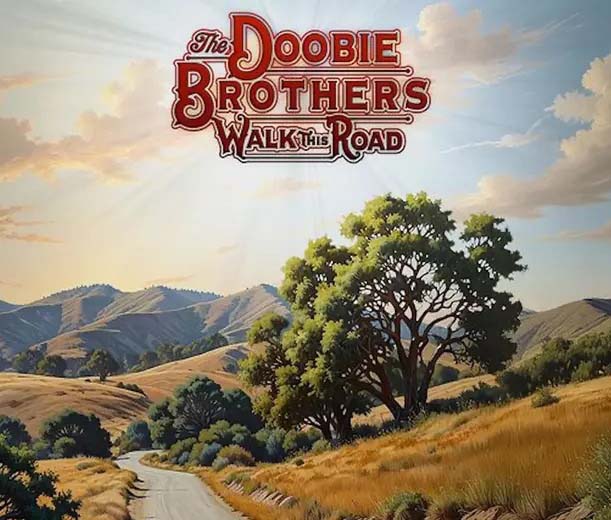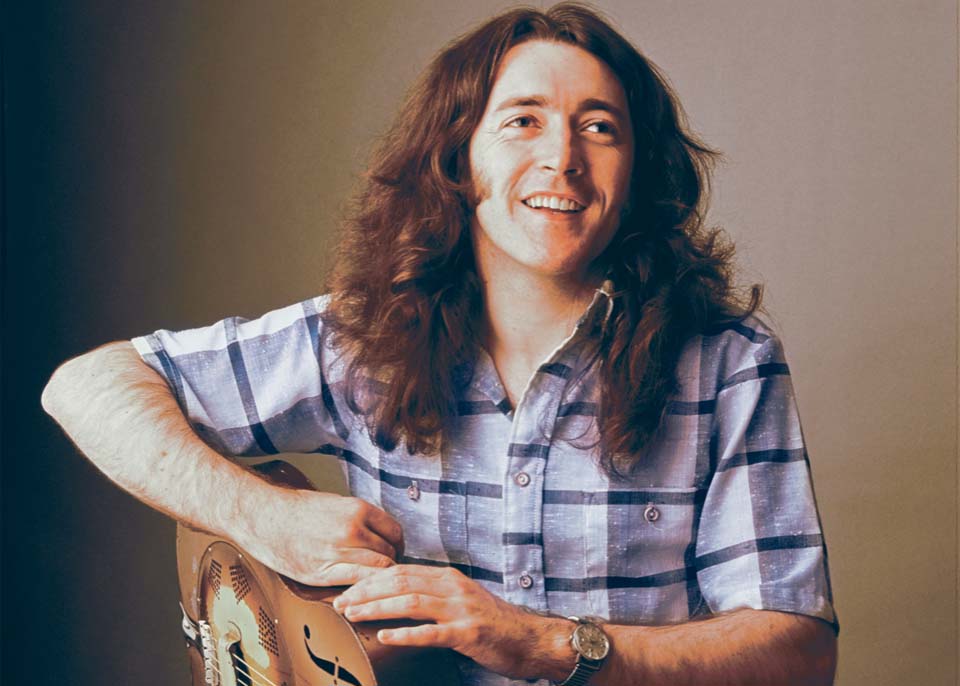- Music
- 28 Jun 25
Doobie Brothers' Pat Simmons: “I feel most regret for future generations because they’re the ones that are gonna suffer for this folly"

Legendary Doobie Brothers guitarist Pat Simmons discusses his disdain for the Trump administration, the band’s new album Walk This Road, and why he’ll always be grateful for learning to play ‘Molly Malone’ as a kid.
Forty-eight million records sold. Four Grammy awards. Entry into multiple halls of fame.
Few can boast the critical and commercial accolades the Doobie Brothers have enjoyed over their 55 years as a band. And their long train is still runnin’, touring arenas this summer in tandem with the release of their 16th studio album, Walk This Road.
There are plenty of reasons to be cheerful. That said, guitarist Pat Simmons is feeling “embarrassed”. Not for himself, but for his country amid the political disarray of the Trump administration.
He’s within his rights to be concerned. Bono, Beyoncé and Bruce Springsteen were some of the names on the receiving end of a petulant Truth Social post recently, with the US President calling for them to be investigated over “illegal” campaign contributions to Kamala Harris (claims which have been proved to be baseless).
“Absolutely,” Simmons says, when asked if he’s worried for artists’ freedom to express their views. “It’s nothing that you would ever have contemplated. You know, we’ve all lived our lives in a country that held up democracy. Democracy was something we all believed in and saw as a beacon of hope for ourselves and the rest of the world.
“That’s pretty much just exploded in a matter of months. We kind of all knew it was possible. But when the reality hits, it’s pretty frightening, it really is. I’ve lived a long, full life. I feel most regret for future generations because they’re the ones that are gonna suffer for this folly. It’s really a terrible thing. It’s criminal.”
Simmons, who is the Doobies’ only consistent member since their foundation in 1970, has been around the block. I ask him where he thinks all the deep-rooted division that’s been synonymous with America of late originates from.
“We have a long history in America of division among people, that we’ve all known about our whole lives,” he explains. “It started in the 19th century with the American Civil War, and prior to the Civil War, there was a lot of dissatisfaction on both sides with commerce and how it was being conducted. It was basically a question of slavery, and that being the cornerstone of how business was being conducted, if you can call it business.
“The South was an agricultural agrarian economy, and it was dependent on slavery, versus the North, which was becoming more of a manufacturing-based economy. So that’s been the division. As time wore on, populations moved about. It’s not North and South anymore. It’s right wing, left wing.
“And it just turned out that there were more right wingers than left wingers, and here we are. It doesn’t mean that people who are conservative are bad people, but the policies that stem from that can be bad. It’s gonna be a lot of suffering. The whole country, the whole world, is suffering.”
 Walk This Road
Walk This RoadClarity And Unity
Music tends to emerge as a bearer of clarity and unity during political turmoil. It’s something the Doobies themselves echoed with ‘Listen To The Music’ in 1972, their first major hit, which acted as a call for the leaders of the world to get along.
Their newest record Walk This Road also acts as a beacon of optimism.
“It’s an album of hope,” Simmons says. “The best things in life are free. Art and athletics, those are the things that have so much value; you don’t have to think about the worst things in life that are going on. You can escape those moments.”
The LP is a confluence of two distinct Doobie eras. It features Tom Johnston, their lead singer during the initial wave of success in the early ‘70s, when the band’s sound was heavier, with more of a folk and R&B influence. Michael McDonald is back in the fold too, the crooner responsible for the Doobies’ sonic shift towards the soft-rock and blue-eyed soul synonymous with their best-selling album, 1978’s Minute By Minute.
“This has been a real rewarding experience,” Simmons says. “Tom and Mike never really worked together that much, so this was really an opportunity for those guys to participate in the making of the record together. All three of us, and John McPhee, contributed some wonderful playing throughout the record. Having the three writers working together for the first time in 40 years really was different.
“Speaking for myself, I’ve always kind of hoped it would happen. I never really thought it would. I always thought Mike would come and play some shows with us, but I never really thought we’d get together and do an album again.
“So here we are. I think it’s one of our better efforts in terms of the songs and the performances. It’s got a little bit of everything in it – the best aspects of all the different writers.”
Defining The Doobie Brothers’ fluid sound is a challenge, considering they’ve had an estimated 28 different members across a shifting music landscape. Simmons, and his distinct fingerpicking style, have remained constants, appearing on every single studio outing since their foundation in 1970.
When asked about his six-string influences, he whips out an iPad and starts to read from a long list.
“Early on, I was listening to more roots players,” he begins. “I listened to Doc Watson, Reverend Gary Davis, Chet Atkins. I love Bob Dylan and the way he finger-picks. Those are my finger-picking guys. I loved
Duane Eddy back in the day, I was a huge Everly Brothers fan too.
“As time wore on, I lived in San Jose, California, and a guy named Jorma Kaukonen used to play around town. He became the guitar player for Jefferson Airplane and was a huge influence for me.
“I loved Rory Gallagher,” Simmons adds. ”He was very popular on the West Coast where I grew up. San Francisco was probably one of the more progressive places on the planet. And the music we were exposed to was always really eclectic.
“It’s one of the earliest places in the US where FM radio became popular. We used to hear a lot of interesting music back in those days. Tom Donahue had a station in San Francisco that played all kinds of music and we were exposed to a lot of different things.
“I tuned into that all the time, every day, every night that I could. Rory was one of those guys that played around a lot.”
Simmons – and he’s not just saying this – has a genuine affinity for Irish music. It’s an appreciation that stems from his formative days as a musician.
 Rory Gallagher.
Rory Gallagher.Full Circle Moment
“I learned it from my guitar teacher, he was teaching a lot of world music. Irish folk stuff came up and I learned ‘Molly Malone’.”
During the Doobie Brothers’ most recent Dublin performance as special guests to Steely Dan, Simmons experienced a remarkable full-circle moment.
“It’s such a beautiful country and the people are wonderful,” he says. “We got to Dublin and I went out with some friends. We went to a pub and the guitar player was up there singing ‘Molly Malone’. It had been a long time since I’d heard it. So I listened to it and I remembered the lyrics and so on.
“And when we were playing with Steely Dan, all the power on stage went out. There was no PA and minimal lighting. We were standing there for a really long time and didn’t know what to do. So I walked up to the front of the stage and started singing ‘Molly Malone’ a capella, and the whole audience started singing the song with me.
“By the time the power came on, we were into the second verse. The audience, of course, knew every word. I was thinking to myself, ‘Thank god I learned ‘Molly Malone’ as a kid!’”
• Walk This Road is out now. The Doobie Brothers play 3Arena, Dublin on July 21.
RELATED

- Music
- 07 Oct 25
Live Report: Patti Smith enthrals on a magic night for the ages

- Music
- 21 Jan 25
The Band's Garth Hudson dies aged 87

- Music
- 24 Jan 24







